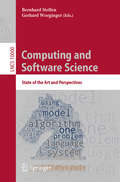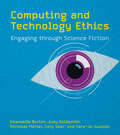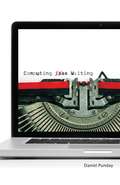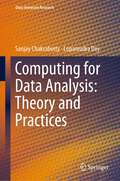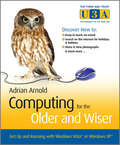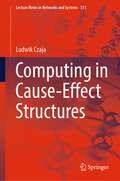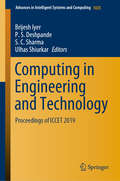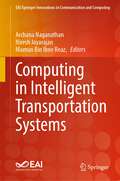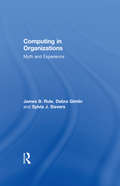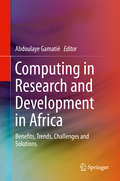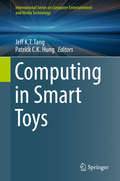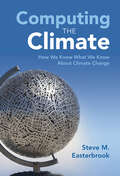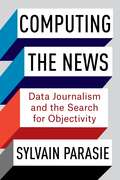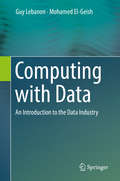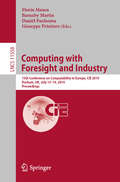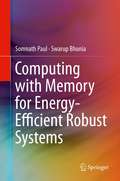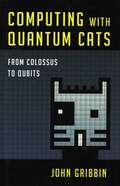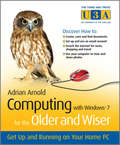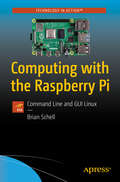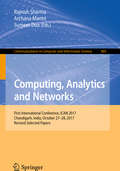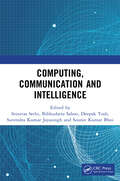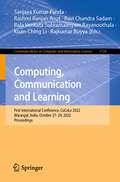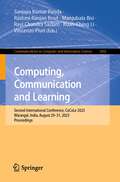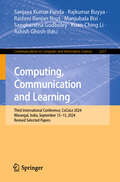- Table View
- List View
Computing and Software Science: State of the Art and Perspectives (Lecture Notes in Computer Science #10000)
by Bernhard Steffen Gerhard WoegingerThe papers of this volume focus on the foundational aspects of computer science, the thematic origin and stronghold of LNCS, under the title “Computing and Software Science: State of the Art and Perspectives”. They are organized in two parts:The first part, Computation and Complexity, presents a collection of expository papers on fashionable themes in algorithmics, optimization, and complexity.The second part, Methods, Languages and Tools for Future System Development, aims at sketching the methodological evolution that helps guaranteeing that future systems meet their increasingly critical requirements.Chapter 3 is available open access under a Creative Commons Attribution 4.0 International License via link.springer.com.
Computing and Technology Ethics: Engaging through Science Fiction
by Emanuelle Burton Judy Goldsmith Nicholas Mattei Cory Siler Sara-Jo SwiatekA new approach to teaching computing and technology ethics using science fiction stories.Should autonomous weapons be legal? Will we be cared for by robots in our old age? Does the efficiency of online banking outweigh the risk of theft? From communication to travel to medical care, computing technologies have transformed our daily lives, for better and for worse. But how do we know when a new development comes at too high a cost? Using science fiction stories as case studies of ethical ambiguity, this engaging textbook offers a comprehensive introduction to ethical theory and its application to contemporary developments in technology and computer science. Computing and Technology Ethics: Engaging through Science Fiction first introduces the major ethical frameworks: deontology, utilitarianism, virtue ethics, communitarianism, and the modern responses of responsibility ethics, feminist ethics, and capability ethics. It then applies these frameworks to many of the modern issues arising in technology ethics including privacy, computing, and artificial intelligence. A corresponding anthology of science fiction brings these quandaries to life and challenges students to ask ethical questions of themselves and their work. Uses science fiction case studies to make ethics education engaging and fun Trains students to recognize, evaluate, and respond to ethical problems as they ariseFeatures anthology of short stories from internationally acclaimed writers including Ken Liu, Elizabeth Bear, Paolo Bacigalupi, and T. C. Boyle to animate ethical challenges in computing technology Written by interdisciplinary author team of computer scientists and ethical theoristsIncludes a robust suite of instructor resources, such as pedagogy guides, story frames, and reflection questions
Computing as Writing
by Daniel PundayThis book examines the common metaphor that equates computing and writing, tracing it from the naming of devices (&“notebook&” computers) through the design of user interfaces (the &“desktop&”) to how we describe the work of programmers (&“writing&” code). Computing as Writing ponders both the implications and contradictions of the metaphor.During the past decade, analysis of digital media honed its focus on particular hardware and software platforms. Daniel Punday argues that scholars should, instead, embrace both the power and the fuzziness of the writing metaphor as it relates to computing—which isn&’t simply a set of techniques or a collection of technologies but also an idea that resonates throughout contemporary culture. He addresses a wide array of subjects, including film representations of computing (Desk Set, The Social Network), Neal Stephenson&’s famous open source manifesto, J. K. Rowling&’s legal battle with a fan site, the sorting of digital libraries, subscription services like Netflix, and the Apple versus Google debate over openness in computing.Punday shows how contemporary authors are caught between traditional notions of writerly authority and computing&’s emphasis on doing things with writing. What does it mean to be a writer today? Is writing code for an app equivalent to writing a novel? Should we change how we teach writing? Punday&’s answers to these questions and others are original and refreshing, and push the study of digital media in productive new directions.
Computing for Biologists
by Ran Libeskind-Hadas Eliot BushComputing is revolutionizing the practice of biology. This book, which assumes no prior computing experience, provides students with the tools to write their own Python programs and to understand fundamental concepts in computational biology and bioinformatics. Each major part of the book begins with a compelling biological question, followed by the algorithmic ideas and programming tools necessary to explore it: the origins of pathogenicity are examined using gene finding, the evolutionary history of sex determination systems is studied using sequence alignment, and the origin of modern humans is addressed using phylogenetic methods. In addition to providing general programming skills, this book explores the design of efficient algorithms, simulation, NP-hardness, and the maximum likelihood method, among other key concepts and methods. Easy-to-read and designed to equip students with the skills to write programs for solving a range of biological problems, the book is accompanied by numerous programming exercises, available at www. cs. hmc. edu/CFB.
Computing for Data Analysis: Theory and Practices (Data-Intensive Research)
by Sanjay Chakraborty Lopamudra DeyThis book covers various cutting-edge computing technologies and their applications over data. It discusses in-depth knowledge on big data and cloud computing, quantum computing, cognitive computing, and computational biology with respect to different kinds of data analysis and applications. In this book, authors describe some interesting models in the cloud, quantum, cognitive, and computational biology domains that provide some useful impact on intelligent data (emotional, image, etc.) analysis. They also explain how these computing technologies based data analysis approaches used for various real-life applications. The book will be beneficial for readers working in this area.
Computing for the Older and Wiser
by Adrian ArnoldComputing for the Older & Wiser is a simple-to-follow user friendly guide aimed at the older generation introducing the basics of mastering a computer. Covering the latest release of Windows Vista Home Premium(TM) and Windows XP(TM), this book is designed for people who want straightforward instructions on how to use their home PC.Written in plain English, using no unintelligible 'computer speak' Adrian guides you step-by-step through the basics of computing including chapters on:Use of the keyboard and mouseEmail and the InternetCustomising your desktopWord processingDigital photographyUseful websitesand much moreUseful tips and tricks and a question and answer revision section in each chapter will build your confidence, get you up-to-date and technologically savvy in no time!If you want to learn how to search and shop online, email or chat to family and friends, and you have the enthusiasm to learn a new skill then this book is for you.With explanatory screenshots in full colourEasy to read fontSupplementary website - including additional exercises to help improve your PC skills, further online hints and tips, and a directory of useful resources. www.pcwisdom.co.uk"Computing for the Older & Wiser will take readers comfortably through getting started on their home PC. The content is similar to what we would take our clients through if they were to attend a class, which is exactly the right level."--Faye Lester, Computer Training Coordinator, Age Concern Camden, UK"I have not had so much fun for years"--Renee Moore, 79, pupil at Age Concern, Colchester, UK
Computing in Cause-Effect Structures (Lecture Notes in Networks and Systems #331)
by Ludwik CzajaThis book focuses on numerous examples of tasks represented by c-e structure. Cause–effect (c-e) structures are dynamic objects devised for algebraic and graphic description of realistic tasks. They constitute a formal system providing means to specify or implement (depending on degree of description generality) the tasks. They can be transformed, thus come under simplification, in accordance with rules-axioms of their algebra. Also, their properties can be inferred from the axioms. One objective of this book is presentation, by many realistic examples, of computing capability of c-e structures, without entering into mathematical details of their algebra. In particular, how computing with natural numbers and in propositional calculus can be performed by c-e structures and how to specify behavior of data structures. But also demonstration of many other tasks taken from the area of parallel processing, specified as c-e structures. Another objective is modelling or simulation by means of c-e structures, of other descriptive systems, devised for tasks from various fields. Also without formalizing by usage of functions between the systems. This concerns formalisms such as reaction systems, rough sets, Petri nets and CSP-like languages. Also on such, where temporal interdependence between actions matters. The presentation of examples is prevalently graphic, in the form of peculiar nets, but accompanied by their algebraic and set-theoretic expressions. A fairly complete exposition of concepts and properties of the algebra of cause-effect structures is in the previous book appeared in the Lecture Notes in Networks and Systems series. But basic notions of c-e structures are here provided for understanding the examples.
Computing in Engineering and Technology: Proceedings of ICCET 2019 (Advances in Intelligent Systems and Computing #1025)
by Brijesh Iyer P. S. Deshpande S. C. Sharma Ulhas ShiurkarThe book is a collection of selected high quality research papers presented at the International Conference on Computing in Engineering and Technology (ICCET 2019), held on January 10–11, 2019 at Deogiri Institute of Engineering and Management Studies, Aurangabad, India. Focusing on frontier topics and next-generation technologies, it presents original and innovative research from academics, scientists, students, and engineers alike.
Computing in Intelligent Transportation Systems (EAI/Springer Innovations in Communication and Computing)
by Archana Naganathan Niresh Jayarajan Mamun Bin Ibne ReazThis book presents various application areas of computing in the automotive sector. The authors explain how computing enhances the performance of vehicles, covering the applications of computing in smart transportation and the future scope. The authors focus on computing for vehicle safety in conjunction with the latest technologies in Internet of Things (IoT). The book provides a holistic approach to computing in an inter-disciplinary and unified view. Topics covered include driverless automated navigation systems, smart transportation, self-learning systems, in-vehicle intelligent systems, and off-road vehicle diagnosis and maintenance, among others. The authors include simulated examples and case studies for better understanding of the technologies and applications. The book is intended for a wide range of readers from students to researchers and industry practitioners and is a useful resource for those planning to pursue research in the area of computing and autonomous driving vehicles.
Computing in Organizations: Myth and Experience
by Debra Gimlin"Is any image in modern times more evocative of social change than the computer? Popular mythology ascribes extraordinary powers to computers in the ordering of human affairs. Computers are seen as instruments of social transformation and economic change. Indeed, it is hard not to find computers in the modern workplace, let alone in the home. They are ubiquitous in government offices, businesses large and small alike, the school, and not-for-profit organizations. In this meticulously researched study of computers and computing, authors James B. Rule, Debra Gimlin, and Sylvia Sievers present a fascinating, entertaining, and thought-provoking survey of the use of what may be the most powerful tool in today's workplace. In the chapter entitled ""The New York Study: Design and Execution,"" the authors describe their inspiration for the undertaking of their study, how they designed their research methods, and how they obtained funding for the project. In the chapter ""What Computers Do; How Computing Changes,"" case studies involving businesses that adopted greater computer usage are described, and the authors explain how the new technology was employed for their benefit. In ""Employment and Efficiency"" time saving and cost-effectiveness qualities of computer technology are explored. And in ""Management and Structure,"" the authors posit the role of the computer in organizational transformation. Computing in Organizations is a timely and relevant work, and will prove of great benefit to strategic consultants, business management personnel, sociologists, and students of information technology."
Computing in Research and Development in Africa: Benefits, Trends, Challenges and Solutions
by Abdoulaye GamatiéThis book describes the trends, challenges and solutions in computing use for scientific research and development within different domains in Africa, such as health, agriculture, environment, economy, energy, education and engineering. The benefits expected are discussed by a number of recognized, domain-specific experts, with a common theme being computing as solution enabler. This book is the first document providing such a representative up-to-date view on this topic at the continent level.
Computing in Smart Toys (International Series on Computer Entertainment and Media Technology)
by Patrick C. K. Hung Jeff K.T. TangThe goal of this book is to crystallize the emerging mobile computing technologies and trends into positive efforts to focus on the most promising solutions in services computing. Many toys built today are increasingly using these technologies together and it is important to understand the various research and practical issues. The book will provide clear proof that mobile technologies are playing an ever increasing important and critical role in supporting toy computing, which is a new research discipline in computer science. It is also expected that the book will further research new best practices and directions in toy computing. The goal of this book is to bring together academics and practitioners to describe the use and synergy between the above-mentioned technologies. This book is mainly intended for researchers and students working in computer science and engineering, and for toy industry technology providers, having particular interests in mobile services. The wide range of authors of this book will help the various communities understand both specific and common problems. This book facilities software developers and researchers to become more aware of this challenging research opportunity. As well, the book is soliciting shall provide valuable strategic outlook on the emerging toy industry.
Computing the Climate: How We Know What We Know About Climate Change
by Steve M. EasterbrookHow do we know that climate change is an emergency? How did the scientific community reach this conclusion all but unanimously, and what tools did they use to do it? This book tells the story of climate models, tracing their history from nineteenth-century calculations on the effects of greenhouse gases, to modern Earth system models that integrate the atmosphere, the oceans, and the land using the full resources of today's most powerful supercomputers. Drawing on the author's extensive visits to the world's top climate research labs, this accessible, non-technical book shows how computer models help to build a more complete picture of Earth's climate system. 'Computing the Climate' is ideal for anyone who has wondered where the projections of future climate change come from – and why we should believe them.
Computing the News: Data Journalism and the Search for Objectivity
by Sylvain ParasieFaced with a full-blown crisis, a growing number of journalists are engaging in seemingly unjournalistic practices such as creating and maintaining databases, handling algorithms, or designing online applications. “Data journalists” claim that these approaches help the profession demonstrate greater objectivity and fulfill its democratic mission. In their view, computational methods enable journalists to better inform their readers, more closely monitor those in power, and offer deeper analysis. In Computing the News, Sylvain Parasie examines how data journalists and news organizations have navigated the tensions between traditional journalistic values and new technologies. He traces the history of journalistic hopes for computing technology and contextualizes the surge of data journalism in the twenty-first century. By importing computational techniques and ways of knowing new to journalism, news organizations have come to depend on a broader array of human and nonhuman actors. Parasie draws on extensive fieldwork in the United States and France, including interviews with journalists and data scientists as well as a behind-the-scenes look at several acclaimed projects in both countries. Ultimately, he argues, fulfilling the promise of data journalism requires the renewal of journalistic standards and ethics. Offering an in-depth analysis of how computing has become part of the daily practices of journalists, this book proposes ways for journalism to evolve in order to serve democratic societies.
Computing with Data: An Introduction to the Data Industry
by Guy Lebanon Mohamed El-GeishThis book introduces basic computing skills designed for industry professionals without a strong computer science background. Written in an easily accessible manner, and accompanied by a user-friendly website, it serves as a self-study guide to survey data science and data engineering for those who aspire to start a computing career, or expand on their current roles, in areas such as applied statistics, big data, machine learning, data mining, and informatics. The authors draw from their combined experience working at software and social network companies, on big data products at several major online retailers, as well as their experience building big data systems for an AI startup. Spanning from the basic inner workings of a computer to advanced data manipulation techniques, this book opens doors for readers to quickly explore and enhance their computing knowledge. Computing with Data comprises a wide range of computational topics essential for data scientists, analysts, and engineers, providing them with the necessary tools to be successful in any role that involves computing with data. The introduction is self-contained, and chapters progress from basic hardware concepts to operating systems, programming languages, graphing and processing data, testing and programming tools, big data frameworks, and cloud computing. The book is fashioned with several audiences in mind. Readers without a strong educational background in CS--or those who need a refresher--will find the chapters on hardware, operating systems, and programming languages particularly useful. Readers with a strong educational background in CS, but without significant industry background, will find the following chapters especially beneficial: learning R, testing, programming, visualizing and processing data in Python and R, system design for big data, data stores, and software craftsmanship.
Computing with Foresight and Industry: 15th Conference on Computability in Europe, CiE 2019, Durham, UK, July 15–19, 2019, Proceedings (Lecture Notes in Computer Science #11558)
by Giuseppe Primiero Florin Manea Barnaby Martin Daniël PaulusmaThis book constitutes the refereed proceedings of the 15th Conference on Computability in Europe, CiE 2019, held in Durham, UK, in July 2019.The 20 revised full papers presented were carefully reviewed and selected from 35 submissions. In addition, this volume includes 7 invited papers. The conference CiE 2018 had the following six special sessions: computational neuroscience, history and philosophy of computing, lowness notions in computability, probabilistic programming and higher-order computation, smoothed and probabilistic analysis of algorithms, and transnite computations.
Computing with Memory for Energy-Efficient Robust Systems
by Swarup Bhunia Somnath PaulThis book analyzes energy and reliability as major challenges faced by designers of computing frameworks in the nanometer technology regime. The authors describe the existing solutions to address these challenges and then reveal a new reconfigurable computing platform, which leverages high-density nanoscale memory for both data storage and computation to maximize the energy-efficiency and reliability. The energy and reliability benefits of this new paradigm are illustrated and the design challenges are discussed. Various hardware and software aspects of this exciting computing paradigm are described, particularly with respect to hardware-software co-designed frameworks, where the hardware unit can be reconfigured to mimic diverse application behavior. Finally, the energy-efficiency of the paradigm described is compared with other, well-known reconfigurable computing platforms.
Computing with Quantum Cats: From Colossus to Qubits
by John GribbinThe quantum computer is no longer the stuff of science fiction. Pioneering physicists are on the brink of unlocking a new quantum universe which provides a better representation of reality than our everyday experiences and common sense ever could. The birth of quantum computers - which, like Schrödinger's famous "dead and alive" cat, rely on entities like electrons, photons, or atoms existing in two states at the same time - is set to turn the computing world on its head. In his fascinating study of this cutting-edge technology, and featuring a new introduction, John Gribbin explores the nature of quantum reality, arguing for a universe of many parallel worlds where "everything is real." Looking back to Alan Turing's work on the Enigma machine and the first electronic computer, Gribbin explains how quantum theory developed to make quantum computers work in practice as well as in principle. He takes us beyond the arena of theoretical physics to explore their practical applications - from machines which learn through "intuition" and trial and error to unhackable laptops and smartphones. And he investigates the potential for this extraordinary science to create a world where communication occurs faster than light and teleportation is possible. This is an exciting insider's look at the new frontier of computer science and its revolutionary implications.
Computing with Windows 7 for the Older and Wiser
by Adrian ArnoldComputing with Windows® 7 for the Older & Wiser is a user friendly guide that takes you step-by-step through the basics of using a computer. Written in an easy-to-understand, jargon free language, it is aimed at complete beginners using PCs running on Microsoft Windows® 7. Inside, you will find step-by-step guidance on:Using the keyboard & the mouseNavigating files and foldersCustomising your desktopUsing Email and the InternetWord processingOrganising your digital photosSafely downloading files from the InternetFinding useful websites and much more
Computing with the Raspberry Pi: Command Line and GUI Linux
by Brian SchellThe Raspberry Pi is about as minimalist as a computer gets, but it has the power to run a full Linux operating system and many great desktop and command line tools as well. Can you push it to operate at the level of a $2,000 computer? This book is here to help you find out.The primary focus of this book is getting as much as possible done with a simple Pi through non-graphic, non-mouse means. This means the keyboard and the text-mode screen. On the desktop side, you'll look at many of the most powerful GUI apps available, as these offer an easy entry to get started as you learn the command line.You'll begin by setting up and configuring a Raspberry Pi with the option to run it as a graphical desktop environment or even more economically boot straight to the command line. If you want more performance, more efficiency, and (arguably) less complexity from your Pi that can only be found through the keyboard and command line. You'll also set up and configure a Raspberry Pi to use command line tools from within either the Raspberry Pi terminal, or by logging in remotely through some other computer. Once in, you'll look at Package Managers, Tmux, Ranger, and Midnight Commander as general-purpose power tools. The book then gets into specific task-oriented tools for reading email, spreadsheet work, notes, security, web browsing and design, social media, task and video password management, coding, and much more. There are conceptual overviews of Markdown, LaTeX, and Vim for work.What You'll LearnSet up a Raspberry Pi system to get real work done using only the command lineLogin to a Pi remotely to use it as a remote server Integrate desktop Linux with command line mastery to optimize a Pi Work with tools for audio, writing news and weather, books, and graphics.Who This Book Is ForThose with minimal technical skills or hobbyists who are interested in “retro computing” or “minimalist” approaches.
Computing, Analytics and Networks: First International Conference, ICAN 2017, Chandigarh, India, October 27-28, 2017, Revised Selected Papers (Communications in Computer and Information Science #805)
by Sumeet Dua Rajnish Sharma Archana MantriThis book constitutes the revised selected papers from the First International Conference on Computing, Analytics and Networks, ICAN 2017, held in Rajpura, India, in October 2017.The 20 revised full papers presented in this volume were carefully reviewed and selected from 56 submissions. They are organized in topical sections on Mobile Cloud Computing; Big Data Analytics; Secure Networks.Five papers in this book are available open access under a Creative Commons Attribution 4.0 International License via link.springer.com. For further details, please see the copyright page.
Computing, Communication and Intelligence
by Srinivas Sethi Bibhudatta Sahoo Deepak Tosh Suvendra Kumar Jayasingh Sourav Kumar BhoiThe International Conference on Cutting-edge Technology in Computing, Communications, and Intelligence- (ICCTCCI-2024) focuses on the application of smart technology and materials for smarter industrial production. The ICCTCCI-2024 provides common platform for presentation of original research findings, exchange of ideas and dissemination of innovative, practical development experiences in different aspects and fields of industry. It also focuses on the event organized with the objective of bringing together academicians, scientists, researchers from industry, research scholars, and students working in different industrial domains and applied applications.
Computing, Communication and Learning: First International Conference, CoCoLe 2022, Warangal, India, October 27–29, 2022, Proceedings (Communications in Computer and Information Science #1729)
by Rajkumar Buyya Kuan-Ching Li Sanjaya Kumar Panda Rashmi Ranjan Rout Ravi Chandra Sadam Bala Venkata Subramaanyam RayanoothalaThis volume constitutes the refereed proceedings of the First International Conference on Computing, Communication and Learning, CoCoLe 2022, held in Warangal, India, in October 2022.The 25 full papers and 1 short paper presented were carefully reviewed and selected from 117 submissions. The CoCoLe conference focuses on three broad areas of computer science and other allied branches, namely computing, communication, and learning.
Computing, Communication and Learning: Second International Conference, CoCoLe 2023, Warangal, India, August 29–31, 2023, Proceedings (Communications in Computer and Information Science #1892)
by Vincenzo Piuri Kuan-Ching Li Manjubala Bisi Sanjaya Kumar Panda Rashmi Ranjan Rout Ravi Chandra SadamThis volume constitutes the refereed proceedings of the Second International Conference on Computing, Communication and Learning, CoCoLe 2023, held in Warangal, India, in August 29–31, 2023.The 25 full papers presented were carefully reviewed and selected from 120 submissions. The CoCoLe conference focuses on Application of Supervised Learning in Computing; Application of Unsupervised Learning in Computing; and Computing in Communication Networks.
Computing, Communication and Learning: Third International Conference, CoCoLe 2024, Warangal, India, September 13–15, 2024, Revised Selected Papers (Communications in Computer and Information Science #2317)
by Rajkumar Buyya Kuan-Ching Li Manjubala Bisi Ashish Ghosh Sanjaya Kumar Panda Rashmi Ranjan Rout Sangharatna GodboleyThis book constitutes the refereed proceedings of the Third International Conference on Computing, Communication and Learning, CoCoLe 2024, held in Warangal, India, in September 2024. The 24 full papers and 10 short papers presented here were carefully reviewed and selected from 149 submissions. These papers have been categorized under the following topical sections: Advancements in AI for Predictive Modeling, Quality Enhancement, and Real-Time Detection Across Various Domains; Machine Learning Advances in Medical Imaging, Agricultural Monitoring, and Multimedia Processing; Advancements in Privacy-Preservation and Intelligent Detection Systems for Federated Learning and Edge Computing.
